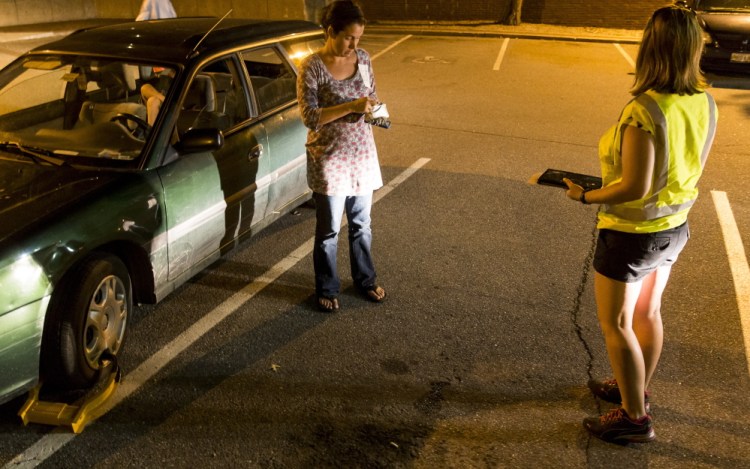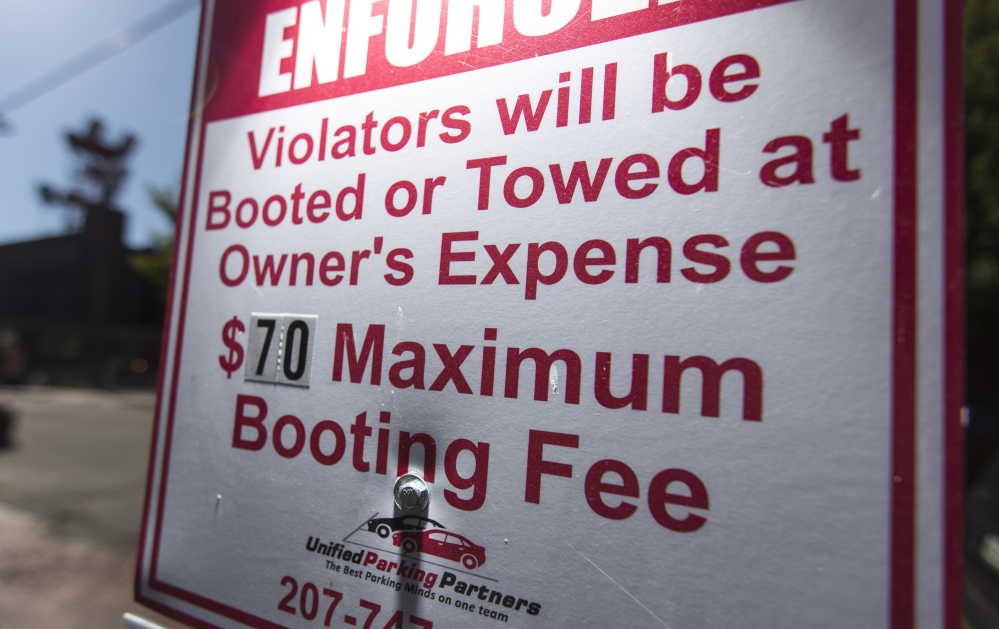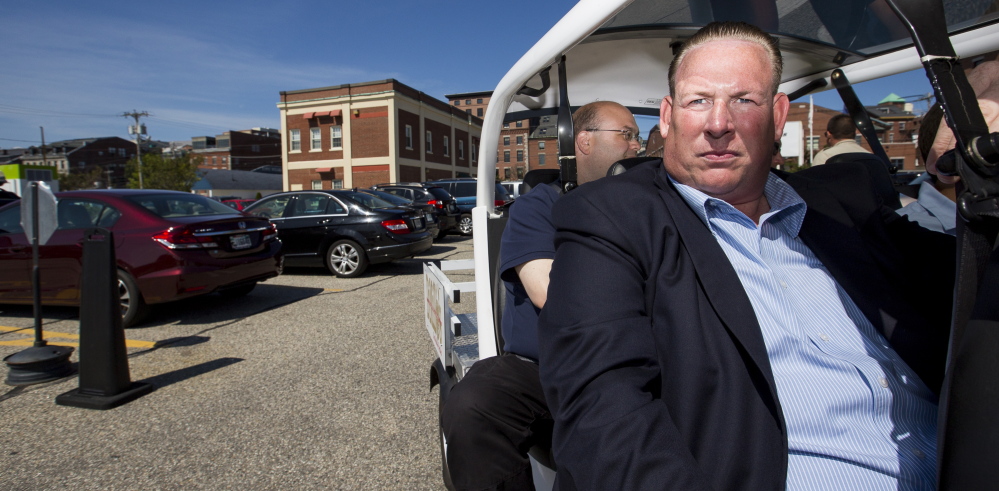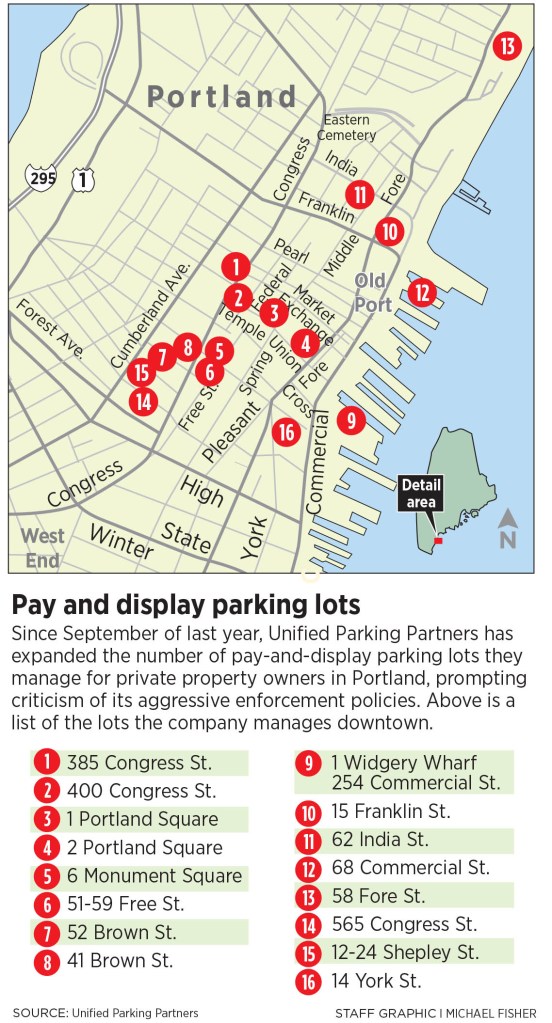A new business that has opened up thousands of parking spaces in downtown Portland on nights and weekends is ruffling the feathers of locals and tourists alike by “booting” vehicles that overstay their paid time.
Unified Parking Partners opened its first pay-and-display lot in 2014 and now manages roughly 40 lots and garages in Portland, including 16 pay-and-display lots downtown. Many are privately owned and closed to the public during the day, but are opened on nights and weekends under Unified’s operation.
As the Portland-based business has grown, so has criticism on social media over its enforcement policies, prompting the company to deactivate its Facebook page. Five complaints have been filed with the Better Business Bureau, and Unified has mostly negative reviews on Yelp, an online service for rating businesses.
However, the company is not breaking any laws, the city said, and the complaints appear to be linked to a business model that’s new to Portland and uses the threat of a hefty fee to encourage customers to pay upon arrival and leave before their time expires.
Owner Dan McNutt said the criticism is unfair and the negative customer reviews are inaccurate. The company keeps detailed records of when people arrive and depart, he said, and it even videos all of its enforcement actions by using body cameras similar to what police officers wear.
McNutt graduated from the University of Maine in Orono in 2005 and previously worked at Idexx Laboratories and owned his own marketing firm. He said his parking company prides itself on its professionalism, even providing haircuts to employees in a complete barbershop set up in his Congress Street office.
Private, pay-and-display parking lots that boot cars to enforce the rules represent a new business model for Portland, but are more common in other cities, including Chicago and Atlanta. The practice has generated complaints elsewhere, too, and led some communities to adopt regulations for companies that boot cars, such as capping fees and requiring warning signs.
LOW RATE OF BOOTING, SIGNS ADDED
Unlike parking lots that collect a flat rate when vehicles enter or charge by the hour when they leave, Unified’s lots require customers to prepay for the time they need, often using automated kiosks, and to display a ticket on the vehicle’s dashboard. Hourly rates vary by lot and season, but are similar to other private parking structures, ranging up to $5 an hour. If a customer is more than 20 minutes overdue, a company employee may place a boot on the vehicle to force the customer to pay a release fee – $40 for up to an hour and $70 after that.
A new cellphone app allows customers to add time if they are going to be late returning to their cars.
McNutt said only 1.6 percent of the nearly 25,000 transactions in July, or about 400, resulted in a vehicle being booted. That low enforcement rate proves the company’s policies are clear and fair, he said.
“I understand it’s unpleasant for someone to find a boot on their tire or have their car towed. I’ve had my own vehicle booted and towed in the past,” he said. “It’s our responsibility to ensure people are paying for the service they are using on our property.”
After the city received complaints about booted vehicles, the company added signs at the city’s request warning customers that enforcement action included booting a vehicle, as well as a maximum fee of $70 to remove the boots, said John Peverada, the city’s parking director.
“I think there is a learning curve here for everybody,” he said.
Those who have been booted by the company describe the business practice as predatory, deceptive and a scam – one that is tarnishing Portland’s reputation as a tourist destination.
Logan Fletcher felt the cold grasp of the company’s boot on July 25 when he returned to his vehicle after attending a friend’s wedding on Peaks Island. The lot at 68 Commercial St., where the parking fee was $5 an hour, was staffed by an attendant when he parked there at 3:15 p.m. Fletcher, a 31-year-old Ph.D. candidate at the University of Maryland, said the attendant helped him figure out how to use the self-pay machine and assured him that $35 would buy enough time to return on the 10:30 p.m. ferry.
Fletcher said he returned to the lot over an hour late and tried to take the booted tire off his car and replace it so he could drive other wedding guests where they needed to go without waiting to have the boot removed. Had he pre-paid for the additional hour, it would have added $5 to his parking fee. But when the parking attendant arrived, Fletcher had to pay $70 to get the boot removed.
Fletcher said he was alarmed by the “threatening legal tone” of the notice placed on his car, and troubled that a private company has the right to place a boot on a vehicle. He believes the city should pass an ordinance regulating booting and fees to prevent abuse.
“I think this is out of line with the character of Portland,” said Fletcher, who otherwise enjoyed his experience in the city. “This seems like a much nicer town than this racket-running going on right in the middle of the Old Port where people are trying to enjoy the city. It’s hard not to associate that feeling with the place as a whole.”
McNutt called Fletcher’s allegations “slanderous.” He said Fletcher was two hours late getting to his car and was tampering with the boot when the agent arrived.
In social media reviews, several people accuse the company of trying to pass itself off as a city-run operation by using the blue “P” sign to indicate public parking, as well as the same brand of pay-and-display machines installed by the city. Like the city’s parking officers, the company’s employees wear reflective vests.
Robert Dowling, 70, was visiting Portland from Santa Fe, New Mexico, on Aug. 16 when he witnessed two young women trying to get a boot removed from their car from a lot near India Street. He had planned on parking in that lot, which he thought was owned and operated by the city, but was discouraged by what he saw, thinking the city was taking a hard line against tourists on a Sunday.
“I thought it was the city sign,” Dowling said. “They misled me completely. That’s really bad because you’re promoting a tourist city. It’s got a really good brand. So these guys are maybe messing up the image.”
CITY REGULATES TOWING, NOT BOOTING
McNutt’s company also provides bellhop, valet and shuttle services to local hotels. The company opened its first pay-and-display lot on Free Street in September 2014 and now employs 170 people, primarily bellhops, parking valets and shuttle drivers for local hotels and restaurants – services it has offered since 2013.
Because most of the lots are not staffed, the only ways to enforce the rules and collect fees when a vehicle overstays are to place a boot on the wheel or tow the vehicle, which can cost roughly $100, McNutt said. The company set its boot fees high enough to discourage people from underpaying and trying to game the system, he said.
Gated systems that allow people to pay on their way out are expensive and not always feasible for smaller lots, McNutt said.
The city regulates towing, but does not regulate the booting of vehicles. Jessica Grondin, the City Hall communications director, wasn’t aware of any efforts to regulate booting vehicles on private lots.
Grondin said the company has added signs at the city’s request to make it clear that the lots are not city-owned or operated. However, the city cannot prevent the company from using the blue “P” symbol because it is an international symbol for parking, she said.
The city also uses a boot for parking enforcement when a vehicle has three or more outstanding parking tickets. It charges a $50 fee and requires payment of all outstanding parking tickets before the boot can be removed.
Since August, McNutt said his employees have been wearing body cameras to build a record of enforcement actions. Agents photograph expired tickets, the vehicle’s license plate number and the condition of the wheel before placing the boot, and they record videos of interactions with customers so complaints about rudeness can be investigated, he said.
Both the company and the city agree the business is providing a much-needed service by opening more parking options for visitors.
McNutt said 2,000 of the roughly 5,000 parking spaces the company manages were previously off limits to the public. The company negotiated agreements with the property owners to allow public parking in the lots when they aren’t being used, sharing the revenue with the lot owners, McNutt said.
“It’s all space that traditionally sat empty on nights and weekends,” he said.
Copy the Story LinkSend questions/comments to the editors.







Success. Please wait for the page to reload. If the page does not reload within 5 seconds, please refresh the page.
Enter your email and password to access comments.
Hi, to comment on stories you must . This profile is in addition to your subscription and website login.
Already have a commenting profile? .
Invalid username/password.
Please check your email to confirm and complete your registration.
Only subscribers are eligible to post comments. Please subscribe or login first for digital access. Here’s why.
Use the form below to reset your password. When you've submitted your account email, we will send an email with a reset code.